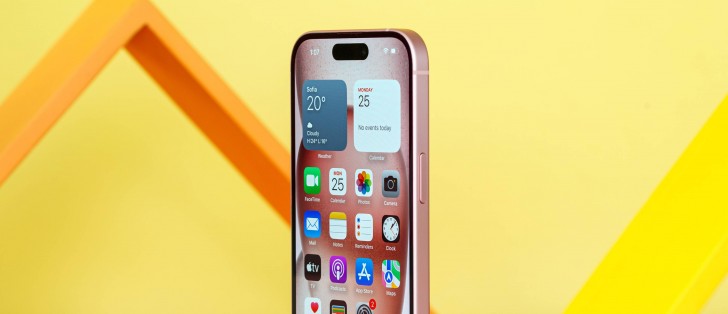Introduction
It’s yet another year of incremental refinement for the vanilla iPhone. Not that anybody expects any major changes at this point. The iPhone 15 offers a few steps forward compared to the 14 without altering the formula in any significant way.
Still, there are a few changes worth noting. The vanilla iPhone finally gets the Dynamic Island from its Pro siblings. In fact, the display is all new this year with significantly improved max brightness. You also get a new 48MP main camera, again bringing the vanilla closer to the Pro models. This includes a new 24MP default resolution for photos, as well as next-gen portraits and 4K@60fps HDR video capture.
Apple iPhone 15 specs at a glance:
Body: 147.6×71.6×7.8mm, 171g; Glass front (Corning-made glass), glass back (Corning-made glass), aluminum frame; IP68 dust/water resistant (up to 6m for 30 min), Apple Pay (Visa, MasterCard, AMEX certified).
Display: 6.10″ Super Retina XDR OLED, HDR10, Dolby Vision, 1000 nits (HBM), 2000 nits (peak), 1179x2556px resolution, 19.51:9 aspect ratio, 461ppi.
Chipset: Apple A16 Bionic (4 nm): Hexa-core (2×3.46 GHz Everest + 4×2.02 GHz Sawtooth); Apple GPU (5-core graphics).
Memory: 128GB 6GB RAM, 256GB 6GB RAM, 512GB 6GB RAM; NVMe.
OS/Software: iOS 17.
Rear camera: Wide (main): 48 MP, f/1.6, 26mm, 1.0µm, dual pixel PDAF, sensor-shift OIS; Ultra wide angle: 12 MP, f/2.4, 13mm, 120-degree.
Front camera: Wide (main): 12 MP, f/1.9, 23mm, 1/3.6″, PDAF; Depth: SL 3D.
Video capture: Rear camera: 4K@24/25/30/60fps, 1080p@25/30/60/120/240fps, HDR, Dolby Vision HDR (up to 60fps), Cinematic mode (4K@30fps), stereo sound rec; Front camera: 4K@24/25/30/60fps, 1080p@25/30/60/120fps, gyro-EIS.
Battery: 3349mAh; Wired, 50% in 30 min (advertised), 15W wireless (MagSafe), 7.5W wireless (Qi), 4.5W reverse wired.
Connectivity: 5G; eSIM; Dual SIM; Wi-Fi 6; BT 5.3; NFC.
Misc: Face ID, accelerometer, gyro, proximity, compass, barometer; stereo speakers; Ultra Wideband 2 (UWB) support, Emergency SOS via satellite (SMS sending/receiving).
The new iPhone 15 also brings about a new Apple A16 Bionic chipset. As is tradition, this is not the latest and greatest Apple has to offer and is shipping with the Pro models, but rather last year’s flagship chip. This might be a blessing in disguise since the new Apple A17 Pro chip is currently amidst a thermal-throttling controversy. The A16, on the other hand, is tired and true. The iPhone 15 also gets a few other “minor” changes, like the inclusion of an Ultra Wideband 2 (UWB) chip for more precise precision finding for the Find My Friends feature.
Oh, and last but not least, Apple has finally moved to USB Type-C. Cupertino was kind of forced to do so due to mounting regulatory pressure, but regardless, the switch is finally a reality. So, if you are in the market for an iPhone 15 series device, you might also need to change out some cables you own.
Left: iPhone 15 • Right: iPhone 15 Plus
However, The real question is how popular the iPhone 15 will be and whether it is worth picking up. We recently ran a poll of our own and going by the numbers and comments, it seems that most of you are rather unenthused about the new Dynamic Island and lukewarm at best towards the new 48MP main shooter and Type-C port. Even so, in both relative and absolute terms, we still expect the iPhone 15 to sell very well. Perhaps not as well as its Pro Max and Pro sibling, but most likely better than the iPhone 15 Plus. So, without further ado, let’s dive into the iPhone 15.
Unboxing
Apple pays plenty of attention to packaging, and rightfully so. Cupertino tends to focus on reduction and reuse in this department, which is always great to see. The boxes have become smaller still, allowing Apple to fit more units in any single shipment, saving on transport and carbon emissions. In terms of materials, the box is made entirely out of cardboard (even the sturdy phone cradle on the inside) and thus is recyclable.
Inside the box, you’ll find a relatively short 1-meter-long USB Type-C to Type-C cable, a SIM ejector tool (outside the US, where the iPhone 15 is eSIM only and lacks a physical SIM tray) and some leaflets. That’s it. Nothing more, nothing less. Apple started the whole “less accessories” trend and is not about to backtrack now. The good news is that if you already have a decent USB Type-C charger, you might only need to swap some Lightning cables and not actually purchase a new charging brick. You just need at least 20W of power to charge the iPhone 15 optimally, ideally a bit more, perhaps in the 30W ballpark just to be safe.

